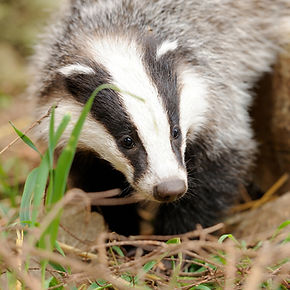Badger persecution in the UK
Badgers have a long history of cruelty and persecution in the UK, spanning hundreds of years. To this day, badgers remain among the most persecuted of all species despite having one of the highest levels of legal protection.
From blood sports to development concerns, thousands of badgers become the victims of wildlife crimes each year. Furthermore, the government-endorsed legal persecution of badgers – in the form of the controversial badger cull – effectively undermines the badger's protected status. A 2022 Badger Trust and YouGov poll revealed that 64% of English adults were either unaware or unsure that badgers are protected by law.
Stopping Badger Crime film
Our short film, Stopping Badger Crime, aims to raise public awareness of crimes against badgers and encourage reporting. Presented by naturalist and broadcaster Mike Dilger, the hard-hitting film reveals the different methods used to persecute badgers and how to recognise the signs. The film also shows how recording and reporting badger crime helps investigators bring offenders to justice.
WARNING: contains distressing content
Types of Badger Crime
Badger Crime is diverse and can include activities from badger baiting, shooting, snaring, poisoning, and lamping badgers with dogs, to sett interference such as blocking entrances or destruction of the sett in its entirety.
Badger crime can be broadly grouped into three categories:

Malicious Crimes
Malicious badger crimes are crimes in which the perpetrator has purposefully targeted a badger or a badger sett. Often violent and organised in nature, malicious badger crime has also been linked to crimes against humans. News reports of criminals convicted of badger crime throughout 2022 demonstrated the link between crimes against badgers and crimes against humans; most offenders convicted of badger crime had previous convictions for crimes including domestic violence, robbery, and grievous bodily harm.
Malicious badger crimes include sett interference, snaring, shooting, lamping and badger baiting.

Negligent Crimes
Negligent badger crimes are activities which result in badgers or their setts being disturbed or harmed without the malicious intent to do so. Even when badgers or their setts are disturbed or harmed by accident, such incidents are classed as criminal in the eyes of the law.
Negligent badger crimes can be related to forestry, farming, development, and dogs getting stuck in setts.

Cyber-enabled Wildlife Crime
Cyber-enabled wildlife crime is the act of using the internet to facilitate illegal wildlife activities (e.g. selling endangered species or their by-products, for example, ivory or rhino horn).
For badgers, it mainly relates to promoting badger persecution by sharing in online spaces such as social media platforms. Badger crime is also linked to cyber-enabled criminal activities.
Both badger persecution and cyber-enabled crime are listed as ‘UK Wildlife Crime Priorities’ by the National Wildlife Crime Unit.
What to do if you suspect a badger crime?
Remember the Three Rs: Recognise, Record and Report
Badger Trust encourages anyone who witnesses badger persecution in person or online to remember the Three Rs: Recognise, Record and Report.

Recognise, Record and Report Cyber-Enabled Badger Crime
If you witness badger persecution shared online, remember the Three Rs: Recognise, Record, Report.
And please Don’t repost it, Report it.
The Badger Watch App
The Badger Watch App is a much-needed tool in the fight to Stop Badger Crime. Find out more and download the Badger Watch App.
Why report Badger Crime?
Watch Chief Inspector Kevin Kelly, Head of the National Wildlife Crime Unit, explain why it’s important to report badger crime.

Why are badgers a protected species in the UK?
Badgers are a protected species because they face high levels of cruelty and mistreatment. In 1992, the Protection of Badgers Act (PBA) gave badgers across the UK unrivalled protection. The National Federation of Badger Groups (precursor to the Badger Trust), was instrumental in bringing this legislation to fruition.
Unlike most native wildlife protections in Britain, the Protection of Badgers Act was initiated due to the unprecedented levels of species-targeted persecution faced by these unassuming nocturnal mammals. Thus, the Protection of Badgers Act is concerned with animal welfare as a priority, compared with the Wildlife and Countryside Act 1981 which focuses more explicitly on wildlife conservation.
Additional legal protection is sometimes provided by the Wildlife and Countryside Act 1981, the Animal Welfare Act 2006 and the Hunting Act 2004. Badgers are also listed in Appendix III of the Convention on the Conservation of European Wildlife and Natural Habitats.

What is Badger Trust doing about badger crime?
Badger Trust campaigns to protect badgers from persecution and #StopBadgerCrime
As the leading voice for badgers in England and Wales, Badger Trust campaigns to strengthen legislation, trains police forces on the ground to enhance the number of successful prosecutions, researches crime trends to inform future policy, and develops new technologies to encourage more public reporting.
Latest campaign news
Badger Trust is the leading voice for badgers in England and Wales. Read the latest Badger Trust news releases, Stop Badger Crime campaign updates and our views on issues that affect badgers, their setts and their habitats.
Downloadable Stop Badger Crime resources
A range of free Stop Badger Crime resources are available for you to download.
A4 posters, ideal for schools, colleges and community centres
Badger Protection and Law classroom resources
Badger Protection and Law classroom resources introduce students to wildlife crime and the role of legislation in protecting badgers. Students will apply their new knowledge to case studies, and evaluate the strengths and weaknesses of current animal welfare laws.
Make a difference to badgers near you.
Volunteer with your local affiliated badger group and help Stop Badger Crime.
Remember the three Rs.
Recognise, Record and Report badger crime to help investigators bring offenders to justice.



%20.jpg)


_edited.jpg)







.png)
%20_jpg.jpg)

